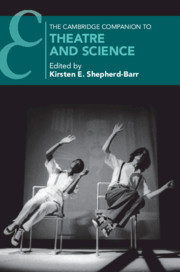Book contents
- The Cambridge Companion to Theatre and Science
- Cambridge Companions to Theatre and Performance
- The Cambridge Companion to Theatre and Science
- Copyright page
- Contents
- Illustrations
- Contributors
- Acknowledgements
- Introduction
- 1 Objectivity and Observation
- 2 Staging Consciousness
- 3 The Experimental/Experiential Stage
- 4 A Cave, a Skull, and a Little Piece of Grit
- 5 The Play at the End of the World
- 6 Bodies of Knowledge
- 7 Pathogenic Performativity
- 8 Theatres of Mental Health
- 9 Devised Theatre and the Performance of Science
- 10 Theatre and Science as Social Intervention
- 11 Acting and Science
- 12 Staging Cognition
- 13 Clouds and Meteors
- 14 ‘The Stage Hand’s Lament’
- Index
- References
8 - Theatres of Mental Health
Published online by Cambridge University Press: 20 January 2021
- The Cambridge Companion to Theatre and Science
- Cambridge Companions to Theatre and Performance
- The Cambridge Companion to Theatre and Science
- Copyright page
- Contents
- Illustrations
- Contributors
- Acknowledgements
- Introduction
- 1 Objectivity and Observation
- 2 Staging Consciousness
- 3 The Experimental/Experiential Stage
- 4 A Cave, a Skull, and a Little Piece of Grit
- 5 The Play at the End of the World
- 6 Bodies of Knowledge
- 7 Pathogenic Performativity
- 8 Theatres of Mental Health
- 9 Devised Theatre and the Performance of Science
- 10 Theatre and Science as Social Intervention
- 11 Acting and Science
- 12 Staging Cognition
- 13 Clouds and Meteors
- 14 ‘The Stage Hand’s Lament’
- Index
- References
Summary
Chapter 8: This chapter analyzes the legacy and influence of the diagnostic gaze in contemporary British theatre, examining how theatre can offer a site to negotiate the complex dynamic between psychiatric institutions and the experiences of patients. Contemporary psychiatry has overseen a vast expansion in the categorization of mental illness. Mental disorders can be identified and ascribed to individual patients in an act of diagnosis that signals mental illness as a ‘performative malady’. Alongside reflecting shifts in the etiology of mental disorder (increasingly focused upon a biomedical model), the speech-act of diagnosis has implications for the legal status and care of the patient. Analyzing works such as Joe Penhall’s Some Voices and Lucy Prebble’s The Effect, this chapter suggests how theatre can offer a reimagination of diagnosis by situating and troubling the role of the psychiatric user.
- Type
- Chapter
- Information
- The Cambridge Companion to Theatre and Science , pp. 116 - 130Publisher: Cambridge University PressPrint publication year: 2020

